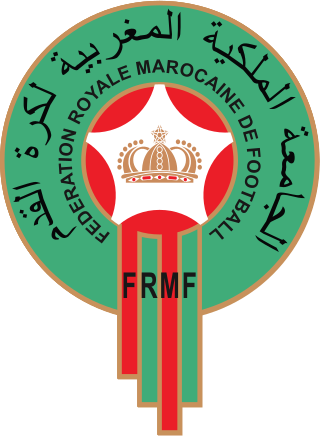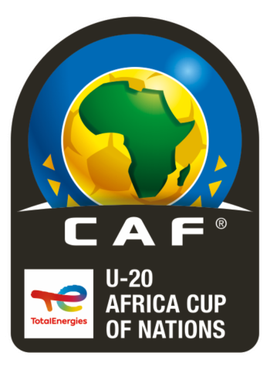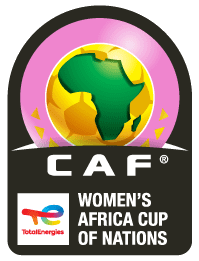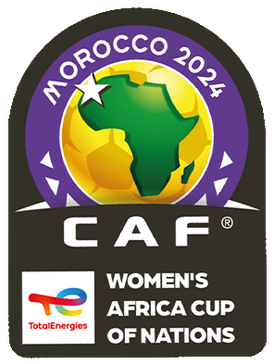
The Confederation of African Football (CAF) is the administrative and controlling body for association football, beach soccer, and futsal in Africa. It was established on 8 February 1957 at the Grand Hotel in Khartoum, Sudan by the national football associations of: Algeria, Egypt, Ethiopia, Nigeria, and South Africa. following formal discussions between the aforementioned associations at the FIFA Congress held on 7 June 1956 at Avenida Hotel in Lisbon, Portugal.

The Morocco women's national football team represents Morocco in international women's football and is managed by the Royal Moroccan Football Federation. The team played its first international match in 1998, as part of the third Women's Africa Cup of Nations.

The African Nations Championship, known for sponsorship purposes as the TotalEnergies African Nations Championship and commonly abbreviated as CHAN, is a biennial African association football tournament organized by the Confederation of African Football (CAF) since 2009 and first announced in September 2007. The participating nations must consist of players playing in their national league competitions.

The U-23 Africa Cup of Nations, known for sponsorship purposes as the TotalEnergies U-23 Africa Cup of Nations, or simply U-23 AFCON or U-23 CAN, is the quadrennial African football tournament organized by the Confederation of African Football (CAF) for its nations, consisting of players under 23 years of age, and was first held in 2011. It has been held every four years since its Inauguration. The top three nations qualify directly from every edition of this tournament for the football tournament of the Olympic Games.

The U-20 Africa Cup of Nations, known for short as the U-20 AFCON and for sponsorship purposes as TotalEnergies U-20 Africa Cup of Nations, previously known as the African Youth Championship and the African U-20 Championship, is the biennial international youth football tournament organized by the Confederation of African Football (CAF) for its nations consisting of players under the age of 20. It serves as the African qualification tournament for the FIFA U-20 World Cup.

Women's soccer began in South Africa during the 1960s and gained popularity in the 1990s, when the first national women's team was formed.

Janine van Wyk is a former South African professional soccer defender and owner of JVW F.C., a club she founded and bears her name. Van Wyk was the captain of the South African women's national team, has the most international caps among African women's national teams with 185 and was the first South African ever to play in the U.S. National Women's Soccer League.

Desiree Ellis is a South African soccer manager and former player. She currently coaches the South Africa women's national team.

Andile ‘Sticks’ Dlamini is a South African soccer player who plays as a goalkeeper for SAFA Women's League club Mamelodi Sundowns and the South Africa women's national team.
Lebogang Ester Ramalepe is a South African professional soccer player who plays as a defender for SAFA Women's League club Mamelodi Sundowns and the South Africa women's national team.

The Women's Africa Cup of Nations (WAFCON), known for sponsorship purposes as the TotalEnergies Women's Africa Cup of Nations and formerly the African Women's Championship, is a biennial international women's football tournament organized by the Confederation of African Football (CAF) since 1998 as the qualification for the FIFA Women's World Cup for African nations. Initially started as a home-and-away qualification competition, it got rechristened as a biennial tournament in 1998 and took on its current name as of the 2016 edition.

Linda Maserame Motlhalo is a South African professional soccer player who plays as a winger for Racing Louisville and the South Africa women's national team. She is also known as the 'Randfontein Ronaldinho'.
Jermaine "Jay" Seoposenwe is a South African soccer player who plays as a forward for Mexican Liga MX Femenil club Monterrey and the South Africa women's national team.
The 2025 Africa Cup of Nations, also referred to as AFCON 2025 or CAN 2025, is scheduled to be the 35th edition of the biennial African football tournament organised by the Confederation of African Football (CAF). It will be hosted by Morocco for the second time and the first since 1988. Morocco was originally scheduled to host the 2015 edition, but withdrew due to fears stemming from the Western African Ebola virus epidemic.
The 2020 Women's Africa Cup of Nations, officially known as the 2020 Total Women's Africa Cup Of Nations for sponsorship purposes, was supposed to be the 14th edition of the biennial African women's association football tournament organized by the Confederation of African Football (CAF). This would have been the first edition to feature 12 teams at the group stages of the tournament as opposed to 8 from previous editions.

The 2022 Women's Africa Cup of Nations, officially known as the 2022 TotalEnergies Women's Africa Cup of Nations for sponsorship purposes, was the 14th edition of the biennial African international women's football tournament organized by the Confederation of African Football (CAF), hosted by Morocco from 2 to 23 July 2022.

Hildah Tholakele Magaia is a South African professional soccer player who plays as a forward for the Kansas City Current of the National Women's Soccer League, on loan from Liga MX Femenil club Mazatlán, and the South Africa national team.
This article lists the squads for the 2022 Women's Africa Cup of Nations, the 14th edition of the Women's Africa Cup of Nations, a biennial women's international football tournament for national teams in Africa, organised by the Confederation of African Football and held in Morocco from 2 to 23 July 2022. Due to the impact of the COVID-19 pandemic in Africa, each national team registered a squad of 26 players.

The 2024 Women's Africa Cup of Nations, officially known as the 2024 TotalEnergies Women's Africa Cup of Nations for sponsorship purposes and as WAFCON 2024 for short, will be the 15th edition of the biennial African women's football tournament organized by the Confederation of African Football. It will be hosted by Morocco in consecutive editions, having hosted the previous edition two years before.
The 2027 Africa Cup of Nations, also referred to as AFCON 2027 or CAN 2027, is scheduled to be the 36th edition of the biennial African football tournament organised by the Confederation of African Football (CAF). It will be hosted by Uganda, Kenya, and Tanzania, in June and July 2027. For the first time, the tournament will take place in three countries.















